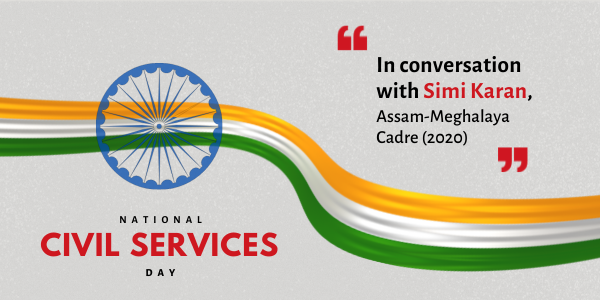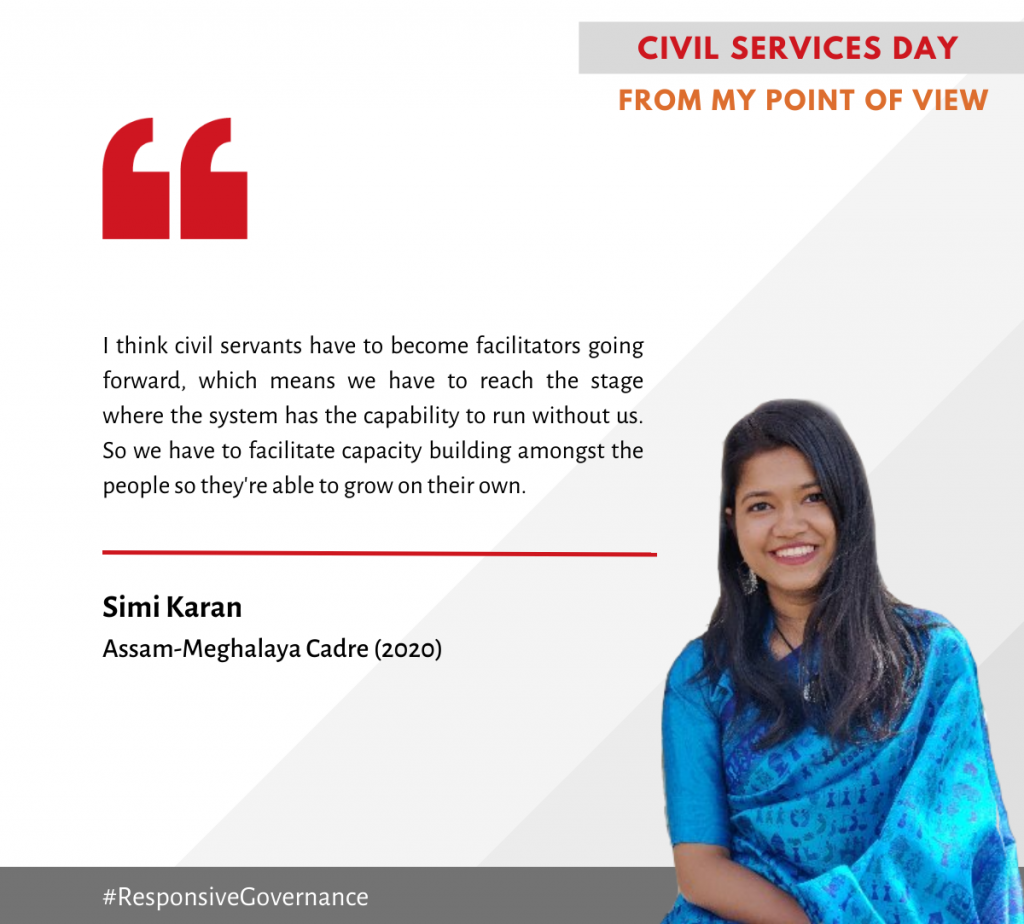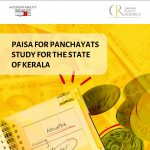
Civil Servants Have to Become Facilitators: Interview with IAS Simi Karan
21 April 2022
The bureaucracy is considered to be the steel framework that makes the country’s development aspirations a reality, but little is understood in the public about the people behind the scenes. State Speak is an exclusive interview series by the Accountability Initiative featuring insights from IAS officers posted in India’s districts and other public officials who have a vantage point on how the country is being governed, related challenges and best practices.
Simi Karan is an entry-level IAS officer from the 2020 batch of the Assam-Meghalaya cadre. She is currently posted as Assistant Commissioner in Sonitpur district in Assam. Her interview below forms part of a series on the contributions and challenges of IAS officers, released on the occasion of Civil Services Day.
Q. Can you share about the district you are working in?
Simi: Sonitpur district is on the northern banks of the Brahmaputra river. The district is called the cultural capital of Assam and has immense strategic significance in India’s geopolity. It also supports a diverse community of people living here.
Q. What are the governance challenges you have faced in Sonitpur and how are you working on resolving these challenges?
Simi: Firstly, Sonitpur has a substantial tribal community working in about 38 tea plantations and there is a language disconnect. A lot of our communication materials for awareness raising on government schemes are in Assamese. But we also have Bodo, Santali, Sadri and Odia speaking communities living here. To increase the effectiveness of governance institutions in these communities, it is very important that we can connect to them in their own language. So, for example, during the Poshan Maah last September, we created a lot of jingles, simple poetry, and similar material highlighting the basic tenets of our schemes in local languages.
Secondly, it is difficult to change established local practices. For example, in the tea tribe communities here, people consume salt with tea. This is very unhealthy, especially for women, as it can lead to issues like low blood pressure, blood sugar, hypertension, anaemia, and so on. This in turn is reflected in the high MMR (Maternal Mortality Rate) and IMR (Infant Mortality Rate) in the communities. So you have to focus on slowly yet steadily changing these practices.
Q. Can you take us through a day in your life as a young IAS officer. What are the kind of activities that you are engaged in, problems you are solving, and plans you are making?
Simi: There is no certainty about how my day would flow; some days are relatively smoother while others are hectic. When I worked as a BDO (Block Development Officer), I would usually try to finish office work in the first half of the day. During the later half I would go to the field; one day it could be a GP (Gram Panchayat), while other day it could be a scheme inspection.
I try to spend as much time as possible in the field, as it is very important for us to familiarise ourselves with it in this training period.
Q. You also spoke about scheme inspection or monitoring schemes. How do you make that happen?
Simi: There are multiple things involved in monitoring schemes. At my level, we conduct a lot of field inspections where we see if set criterias are being met or not. Then there’s deeper engagement with the community which brings to the fore local issues that are hampering implementation. For example, in Assam, engineers in the Block or GP would not properly share their plan estimates with the president of the local 15th Finance Commision fund committees, indicating a communication gap between the functionaries and the local people. These seem like small differences but strict instructions have to be given to ensure smooth operation.
Q. On a personal note, what motivated you to join the IAS? What are the governance challenges that you are seeing as a young officer and what drives you?
Simi: During my studies, like any other IIT student, I was planning to do CAT or an MBA, or probably go abroad. But in my second year, I attended a public policy boot camp. As part of this I interacted with people from all walks of life — grassroot workers, NGO workers, academicians, politicians, and bureaucrats. I also got the opportunity to hear from a retired IAS officer, who was working in the Education Ministry at the time. I was shocked at the kind of role he played and the kind of interventions he was able to do. I started reading more about the IAS, understanding more about the role, and was really attracted to the diversity of tasks within the IAS.
Also, the work itself is actually quite challenging and rewarding. So I think that’s my prime motivation. And coming into the service, there’s a reality check that it is not easy to translate on-paper solutions to the field. For example, crowdfunding. In addition, the work is region-specific and related to local sentiments.
Initially, it was also hard to understand the hierarchy and order of things, but the learning process got smoother with time. There is an immense learning curve during the two years of probation, which is what excites me.
Q. India is celebrating the 75th year of independence. As per you, what will be the role of the IAS cadre going forward? What is the kind of support that you think early career civil servants will need to be able to grow?
Simi: I think civil servants have to become facilitators going forward, which means we have to reach the stage where the system has the capability to run without us. We have to facilitate capacity building amongst the people so they’re able to grow on their own. But we are still at a very nascent stage where more support is needed.
I have a very beautiful example for this from Meghalaya, where an IAS officer handheld a small local women entrepreneur through the government structure to receive the aid and funds she needed. Today, the woman has scaled her business to 100 workers and is attending an expo in Dubai to showcase her work. She is capable of branching out her work and engaging with government institutions. We need to start empowering people so that they are able to reach the stage where they’re able to make decisions and are able to fend for themselves,
In terms of the support that new civil servants need, as a new joinee one really doesn’t know how the entire system works and a lot of things – like connecting with senior bureaucrats – happens on an informal basis. More opportunities to connect and learn in that sense are really important.
Secondly, moving forward, specialisations would be needed. Every field today is becoming more specialised, be it environment, health, nutrition, etc. And the people we are dealing with as IAS officers today are experts in their fields. To be able to make our own contribution, we need to have a certain level of knowledge so that we can sit and discuss with them and come to a conclusion. And that’s where specialisation comes in.
Q. According to you, what are the governance challenges that India will be looking at in the coming 10 years?
Simi: I think environment and climate change will be major issues in the coming decade, as we are already seeing its impact. For example, last year, there were places in Assam which saw drought-like situations due to much lower rainfall than expected. From the broad spectrum of climate change, a lot of micro level issues specific to regions, like this, will come up in the future.
Also, since I take a lot of interest in education, I think we really have to work more on pedagogy and the quality of teaching. The initiatives we see today are still largely limited to infrastructure, but now we need to move more towards pedagogy and learning levels of children.

Transcription by Prateek Gupta.
The opinions expressed are personal and do not represent an institutional stand.
Also Read: The Conundrum on Capacity Development of India’s Local Government Elected Representatives






One thought on “Civil Servants Have to Become Facilitators: Interview with IAS Simi Karan”